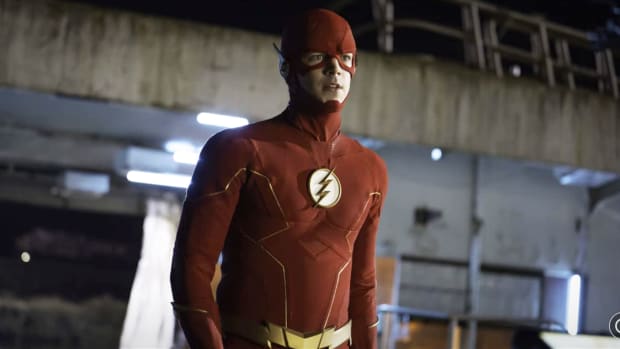There was a time that The CW had so many comic book-based TV shows that even Kevin Feige, head of Marvel Studios (DIS), may have thought the network was overdoing it a touch.
This summer The CW canceled the DC comics based shows“Batgirl” and “Legends of Tomorrow.” But with the recent news that “The Flash,” which is also based on characters from DC comics and was once one of the network’s most popular shows, will return for an abbreviated ninth season, some onlookers have asked if the network still has anything left to watch?
To be clear, there’s still a few things left on The CW, including reboots of “Kung Fu” and “Riverdale,” an off-the-wall adaptation of Archie comics. But it's far cry from where the network was even five years ago.
While The CW’s ratings numbers weren’t going to make HBO nervous or anything, it was once a thriving network that had a dedicated following amongst teenagers and young-at-heart comic book fans. But now the network is quickly beginning to look like a cultural going out of business sale. What happened?
A Brief History of The CW
The CW is named after its two parent companies, CBS Entertainment Group, which is now known as Paramount Global (PARA) and Warner Bros., which is now known as Warner Bros. Discovery, (WBD).
The channel was formed in 2006 as a merger of the companies’ television off-shoots The WB and UPN. The WB had wild success in the late ‘90s, as shows such as “Buffy The Vampire Slayer” and “Dawson’s Creek” ushered in a new wave of teenage dramas. The UPN never had quite that level of pop culture recognition, though it had dedicated fan bases for the sitcom “Everybody Hates Chris” and the cultishly loved teen mystery show “Veronica Mars.” It also did well for itself with “WWE SmackDown!”
Neither network was particularly profitable on its own, so the two companies combined forces for The CW. The idea was the network would create relatively cheap shows for a younger demographic than networks typically target, and the parent companies would make money from what the Hollywood Reporter described as “lucrative international rights.”
Then in 2011, the network struck a $1 billion dollar deal with Netflix; eventually new seasons of shows like “Riverdale” and “Arrow,” which kick started the network’s wave of superhero shows, were available on the streaming service within two weeks of their seasons ending.
Because of this deal, the network found it profitable to continue to renew low-rated shows such as the “Dynasty” reboot and the critically acclaimed show “Crazy Ex-Girlfriend.” For a while, many fans of CW shows such as “Riverdale” and “The Vampire Diaries” associated them more with Netflix than their original network.
But that deal with Netflix ended in 2019, as both the parent companies wanted to begin focusing on making shows for their streaming services, HBO Max and what’s now known as Paramount+. (That’s why the reboot of“Gossip Girl,” once one of The CW’s most popular shows, is on HBO Max.)
“Not only does it lose somewhere in the neighborhood of $100 million per year, the dual ownership doesn't make anyone happy in today's streaming world,” says Rick Ellis, Founder and Managing Editor at AllYourScreens.com. “The CW has been slowly cutting older shows over the past year. In part to reduce the spending, but also shows such as ‘The Flash’ and ‘Riverdale’ still fall under an old output deal The CW signed with Netflix.
“Any shows that premiered after the deal ended in 2019 are free to be licensed elsewhere, but the odd contractual stuff plus the inevitable higher costs of a show that has been on the air for multiple seasons means shows such as ‘The Flash’ or ‘Riverdale’ are tops on the chopping block.”
With that deal ended, there was less incentive for The CW to continue to make shows that never found much of an audience for the network, and this May it canceled ten shows and only renewed eight. And since the beginning of the year, the two networks have reportedly been contemplating a sale of the network.
The broadcasting company Nexstar Media Group (NXST), is often mentioned as a possible buyer, but no deal has been finalized. The company, Miller notes, “ owns a large number of local TV stations, including a number of CW affiliates.”

The CW
Expect Further Cutbacks At The CW
The CW is still mining the vaults of DC Comics for television shows, as next year will see the debut of the Batman spin-off series “Gotham Knights.”
Until an acquisition deal is actually made and finalized, it’s hard to say what the future of The CW will look like. But Jason Cherubini, CFO of Dawn's Light Media, a film and media production company, speculates that further cut backs are likely, as we are a long ways away from the network’s glory years.
“The short answer as to what is going on with the CW is that it is being prepped for sale/is selling in order to cover its substantial debt/losses,” he says. “As of the beginning of July, it looks like Nexstar will be purchasing a 75% stake in the CW primarily through the taking over of its debt. Nexstar is currently the largest CW affiliate owner and is big in local television. The CW will most likely continue to have original programming cut and it will primarily air low-cost/high-profit content such as those shows in syndication.
“I would suspect that shifts like this will not be uncommon moving forward with many distribution outlets, such as television channels choosing to move away from the costs and risks associated with original programming.”
“The Flash,” which followed the adventures of the world’s fast superhero, had a nice long run. But even a superhero can’t outrun the realities of a shifting media landscape.







